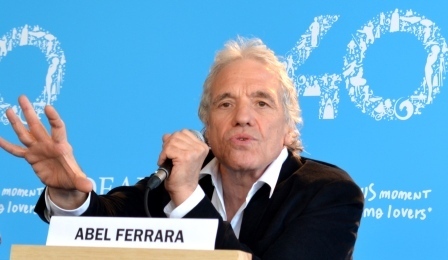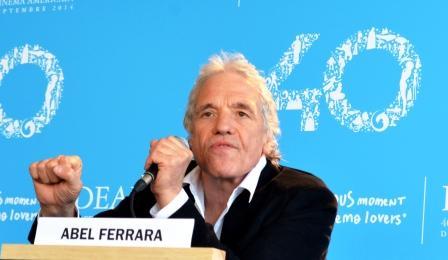Take away the poetry from Pier Paolo Pasolini's artistic vision and one has Abel Ferrara's Pasolini, a film about the writer-director's last days, which premiered this last week in France at the Deauville American Film Festival. The highlight of Ferrara's biopic is that it includes quotations of Pasolini's actual writings and interviews and uses them to give some meaning to the artist's tragic murder in 1975. The film begins with an interview with a dapper Pasolini, who confidently tells a journalist: "All sex is political." Later, we hear a clip from Pasolini's writings in which he argues that the violence of institutions in society makes each of us violent. These two claims are given evidence in Ferrara's rendering of Pasolini's last hour on earth: the director's brutal murder by a young prostitute he picked up for sex (Pino Pelosi)--and by his group of thug friends--is filmed in a jerky fashion as an demeaning ugly act of violence, emblematic of a crass society, of which Pasolini is a complicit participant. Unlike scenes of sex and violence in Pasolini's movies, which are filmed with a sublime awe--replete with close ups of beauteous young faces and bodies--Ferrara films the final pick-up as a vulgar scene between an aging well-meaning predator confidently cruising in his Alfa Romeo and a rude boy of the "borgata" with a pimply complexion and chubby cheeks, and as little charm as the spaghetti al aglio he orders in a dismal trattoria.
A Pasolini fan, I had expected to find in Ferrara's new film a portrait of the sensitive artist who militated, in his writings, against the crude materialism that characterized, in his opinion, post-Economic Miracle Italy, and made sublime films that gave value, as a political statement, to rural traditions and rituals, while elegizing the beauty of proletarian youth. While the political tenet of Pasolini's is given ample (and commendable) room in Ferrara's film, the sublime aspect--in both the aesthetics of the film and in the writings chosen--is missing. The only evidence of the director's longing for the sublime lies in a hokey vision of a mystical planet that, in a fantasy side-story, an imaginary character (one of Pasolini's own, from his unfinished novel Petrolio) follows with nearly ridiculous wonder inbetween the realistic scenes.
As for the realistic scenes, they are...drably realistic. Bourgeois dinner conversations; office phone calls with celebrity writers; chummy conversations with Pasolini and his mother. Everything descends in this film to the lowest denominator. Pasolini's cruel orgy scenes in Salo--which he filmed in stunning artistic detail, to shock the viewer to awareness of the fascistic tendencies in human beings--are re-animated in Ferrara's film as crass animalistic fuck-scenes. In Salo, we feel outraged by the men in suits who force naked girls to kneel to eat dog food and swallow nails. In Ferrara's orgy scenes, we merely feel disgusted. Similarly, the religious music and baroque chords--ie. Bach and Callas--that accompany Pasolini's lyrical close-ups of the human face in his films Medea and The Gospel According to Saint Matthew --resound in Ferrara's movie as creepy and ominous, an outrage to the sublimity of Pasolini's own soundtracks.
Indeed, the only nod to Pasolini's humanist love of the human being lies in Ferrara's depiction of Pasolini's mother (Adriana Asti), who gives a stellar portrait of agonized grief upon the news of her son's death. As for Pasolini, he seems a nice enough man with compelling convictions, but the only similarity I could detect between Dafoe and his character lay in the uncannily similar architecture of their jawlines. Compare the two interviews here, in these two video clips, one featuring the actual Pasolini and the other, the Dafoe version. Dafoe's calm authoritative presence is a far cry from Pasolini's vulnerable sensitivity and passion.
https://www.youtube.com/watch?v=w9Ef1y_OY-U
https://www.youtube.com/watch?v=E_rZu_PP9mM
I asked Abel Ferrara at the press conference what happened to the poetry.
"We do have scenes of sublime kids!" Ferrara responded vociferously. "We have scenes showing that, like the soccer match of the boys. But Pasolini was getting disgusted by the kids. He has been changed. Things have changed. You have to see the change. His feelings about the kids has changed." He waved his hand. "Salo [1976] is a long way from Accatone [1961]!"
He continued with gusto: "Pasolini is a man of action. We are not in nostalgia. He is pretty clear in his writings of 1975. He talks about shutting the schools down: they are not teaching kids anything good for them. Shut that tv off: it's just teaching shit! Pasolini is not into mystery. He is a man who says: 'You must act.'"
Ferrara's take on his subject was consistent. Throughout the press conference, the feisty director repeatedly returned to this (exclusive) view of Pasolini as a political man:
"Of course he is political. Pasolini is a diamond, and has a many facets as a diamond. How can you separate the political from personal life? To be gay in that city at that time was political. Living with his mother was political. He might write for Corriere de la Sera, have two screenplays in the works: that is all part of the political."
The director also indicated, as I suspected from the movie, that he interpreted the murder as part and parcel of what Pasolini was denouncing in his political writings:
"Pasolini shows that consumerism is worse than fascism. The desire for things, the desire for shit. At a certain point [in time in Italy], whoever it is, a rich person, a bourgeois or a kid in the borgata, they all know every Rolex brand. The kid in the borgata would be ready to kill for that pleasure [to own that Rolex].......for that Alfa Romeo."
As for Pasolini's fateful last cruise in his Alfa Romeo:
"People know where Pasolini was going at ten at night. What got him is his lifestyle, is looking for that primal thing, the real, you dig?" Ferrara raised his fist. " He needed to feel the Real. He wasn't at that train station looking for a new assistant! The kids at the train station weren't kids he found at the university. Those kids he was hanging out with were killers. A violence he was attracted to. He needed to go there."
Note that the circumstances of Pasolini's murder have never been resolved, whether the boy Pino Pelosi acted alone or was set up, as he now claims, and some criminal or political organization was behind the brutal killing.


